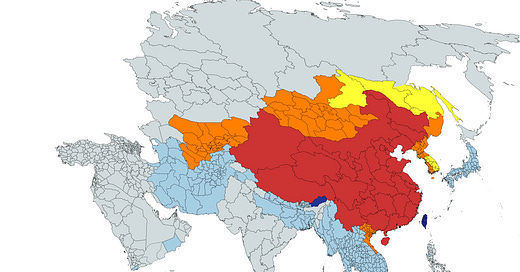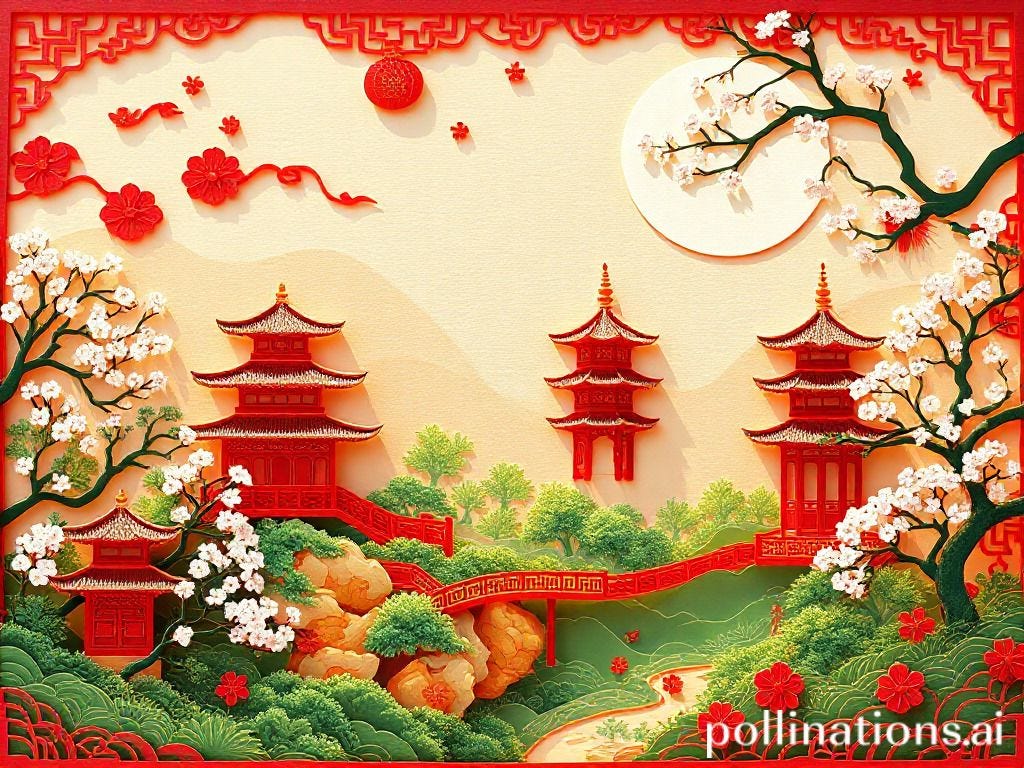free Halloween eBooks! GHOST STORY
Something Spooky going on! First the essay, then the free eBooks, and then the word of the day.
Mongolia, Vietnam, (North) Korea
The map roughly depicts the maximum territorial extent of China's historical influence. I call it: "peak China." However, this map is problematic for several reasons. Firstly, it portrays a loose governance system with the core of state power concentrated in Beijing, gradually weakening as one moves further away from the capital, governing through tributary and vassal states as much as through direct imperial power. That form of governance is likely inappropriate to modern statecraft, which relies on more centralized and efficient governance structures. China's current governance system is characterized by a strong centralized government, with a clear chain of command and decision-making processes (Lampton, 2014).
Moreover, the map is a snapshot of the past, and as the saying goes, "the past is not the future." Historical territorial claims and spheres of influence do not necessarily translate to modern-day realities. The world has undergone significant changes, and the dynamics of international relations have shifted dramatically. As Henry Kissinger noted, "the concept of sovereignty has changed over time, and the notion of a fixed territorial boundary is no longer as relevant as it once was" (Kissinger, 2014).
Another issue with the map is that it glosses over the distinct languages spoken in the regions depicted. Language is a crucial aspect of state power, and the fact that these languages are distinct highlights the complexities of governance in these areas. For example, Mongolia, a vassal state, has its own unique language and cultural identity that cannot be simply subsumed under Chinese dominance. According to a study by the Mongolian Ministry of Education, the Mongolian language is spoken by over 90% of the population, and is an important part of Mongolian national identity (Mongolian Ministry of Education, 2019).
Furthermore, the map fails to account for the significant changes brought about by modernity. Unlike pre-modern societies, modern states do not rely on corporal punishment, capital punishment is less common, slavery has been abolished, and women have formal equality and greater freedom from sex-specific roles. These changes have transformed the way states interact with each other and with their citizens. As Amartya Sen noted, "the idea of human rights has become a central part of modern international relations, and has had a profound impact on the way states treat their citizens" (Sen, 2011).
China's current attitude towards Mongolia is telling. Rather than seeking to conquer and assimilate (outer…) Mongolia, China prefers to maintain a compliant and friendly state that can serve as a buffer against potential threats. This approach is pragmatic, as conquering Mongolia would only add to China's problems without solving any existing ones. Inner Mongolia, a province of China, is already a source of tension, and incorporating Outer Mongolia would only exacerbate these issues. According to a report by the International Crisis Group, China's approach to Mongolia is driven by a desire to maintain stability and security in the region (International Crisis Group, 2019).
Similarly, China's stance on Korea is guided by pragmatism. North Korea, despite being led by a psychotic clique of fake Maoists, serves as a useful buffer state for testing party ideology and conducting covert operations. China is unlikely to oust the current North Korean regime, as this would create more problems than it solves. South Korea's desire for reunification is also unlikely to be realized, as China prioritizes security over reunification. This status quo is detrimental to Koreans, particularly those in North Korea. As a report by the Brookings Institution noted, "China's approach to North Korea is driven by a desire to maintain stability and security in the region, rather than a desire to promote reunification" (Brookings Institution, 2020).
The northern part of Vietnam was once a Chinese province or vassal state, and China's 1979 invasion of Vietnam ended in defeat. China is unlikely to seek a rematch, and instead views Vietnam as a potential buffer state. The Vietnamese are known for their ferocity in battle, yet unwilling to fight others' wars. They are thus better as a neutral neighbor than a quagmire. According to a study by the RAND Corporation, Vietnam's military is one of the most capable in Southeast Asia, and is a key factor in China's decision-making on the region (RAND Corporation, 2018). China already tried to invade Vietnam back in 1979 and figured out fairly quickly that was a stupid idea. Hopefully Washington will become so wise about war.
The relationship between Vietnam, China, and the United States will be a point of contention in the future. Vietnam is likely to play both sides against each other, exploiting their rivalry to its advantage. Both China and the US have unrealistic expectations about Vietnam, which is well aware of its position between two powerful nations. Vietnam will likely continue to maintain its independence and avoid becoming too closely aligned with either side. As a report by the Center for Strategic and International Studies noted, "Vietnam's foreign policy is driven by a desire to maintain its independence and sovereignty, and to avoid becoming too closely aligned with either China or the US" (Center for Strategic International Studies, 2020).
In conclusion, the map depicting "peak China" is a somewhat inaccurate representation of historical and modern realities. China's approach to its neighbors is guided by pragmatism, prioritizing stability and security over territorial expansion. The complexities of language, culture, and modernity must be taken into account when evaluating China's relationships with its neighbors.
So don't be panicked. Don’t be a sucker. Supporting and encouraging Vietnam is a viable strategy to keep Vietnam from turning into a Chinese vassal state, but expecting it to reopen Cam Ranh Bay for the USN is unrealistic.
References:
Brookings Institution. (2020). China's approach to North Korea: A pragmatic strategy. Brookings Institution.
Center for Strategic and International Studies. (2020). Vietnam's foreign policy: A delicate balance. Center for Strategic and International Studies.
International Crisis Group. (2019). China's approach to Mongolia: A pragmatic strategy. International Crisis Group.
Kissinger, H. (2014). World order. Penguin Books.
Lampton, D. M. (2014). Following the leader: Ruling China, from Deng Xiaoping to Xi Jinping. University of California Press.
Mongolian Ministry of Education. (2019). Mongolian language and culture. Mongolian Ministry of Education.
RAND Corporation. (2018). Vietnam's military: A capable and modern force. RAND Corporation.
Sen, A. (2011). The idea of justice. Harvard University Press.
free ebooks!
Terrible Tales & Worse Verse
“I see dead people”
Wills Trusts and Estates Law Digital Review Flashcards
The Devil's Diplomatic Dictionary
Lucifer's Legal Lexicon
Watergate 2.0
kill the undead vampire!
Here are the translations for the word "Ghost" and the provided sentence:
- English: Ghost (n)
- French: Fantôme (n)
- Spanish: Fantasma (n)
- German: Geist (n) (m)
- Estonian: Kummitus (n)
- Russian: Призрак (n) (m)
- Ukrainian: Привид (n) (n)
- Mandarin Chinese: 鬼 (guǐ) / 鬼 (guǐ)
Translations for the sentence:
- English: In English, sometimes spies are called ghosts or spooks.
- French: En anglais, les espions sont parfois appelés fantômes ou espions.
- Spanish: En inglés, a veces los espías se llaman fantasmas o espías.
- German: Im Englischen werden Spione manchmal Geister oder Spione genannt.
- Estonian: Inglise keeles nimetatakse aina kaitsekaitseid või kummituspüügiseid ka kummituspüügised.
- Russian: В английском шпионы иногда называются призраками или шпионами.
- Ukrainian: В англійській мові шпигунів іноді називають привидами або шпигунами.
- Mandarin Chinese: 在英语中,间谍有时被称为鬼或间谍。 (zài yīngyǔ zhōng, jiànbù yǒushí bèi chēngwéi guǐ huò jiànbù.)











